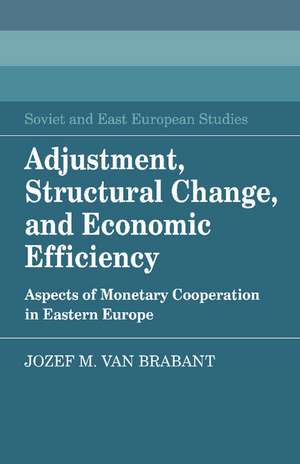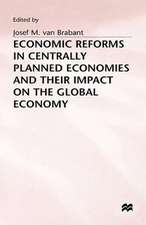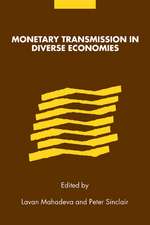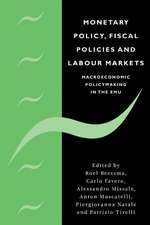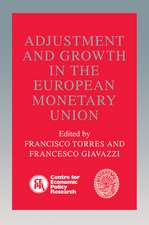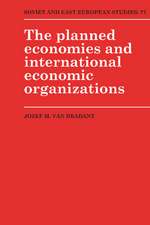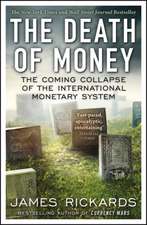Adjustment, Structural Change, and Economic Efficiency: Aspects of Monetary Cooperation in Eastern Europe: Cambridge Russian, Soviet and Post-Soviet Studies, cartea 58
Autor Jozef M. van Brabanten Limba Engleză Hardback – 24 dec 1987
Din seria Cambridge Russian, Soviet and Post-Soviet Studies
-
 Preț: 228.71 lei
Preț: 228.71 lei -
 Preț: 374.50 lei
Preț: 374.50 lei -
 Preț: 448.80 lei
Preț: 448.80 lei -
 Preț: 435.54 lei
Preț: 435.54 lei -
 Preț: 322.62 lei
Preț: 322.62 lei -
 Preț: 362.30 lei
Preț: 362.30 lei -
 Preț: 395.38 lei
Preț: 395.38 lei -
 Preț: 378.96 lei
Preț: 378.96 lei -
 Preț: 305.51 lei
Preț: 305.51 lei -
 Preț: 295.19 lei
Preț: 295.19 lei -
 Preț: 283.03 lei
Preț: 283.03 lei -
 Preț: 207.35 lei
Preț: 207.35 lei -
 Preț: 280.15 lei
Preț: 280.15 lei -
 Preț: 323.65 lei
Preț: 323.65 lei -
 Preț: 406.33 lei
Preț: 406.33 lei -
 Preț: 319.61 lei
Preț: 319.61 lei -
 Preț: 273.13 lei
Preț: 273.13 lei -
 Preț: 281.49 lei
Preț: 281.49 lei -
 Preț: 284.98 lei
Preț: 284.98 lei -
 Preț: 330.09 lei
Preț: 330.09 lei -
 Preț: 284.98 lei
Preț: 284.98 lei -
 Preț: 278.80 lei
Preț: 278.80 lei -
 Preț: 284.39 lei
Preț: 284.39 lei -
 Preț: 287.07 lei
Preț: 287.07 lei -
 Preț: 238.90 lei
Preț: 238.90 lei -
 Preț: 320.17 lei
Preț: 320.17 lei -
 Preț: 283.03 lei
Preț: 283.03 lei -
 Preț: 320.38 lei
Preț: 320.38 lei -
 Preț: 456.97 lei
Preț: 456.97 lei -
 Preț: 279.76 lei
Preț: 279.76 lei -
 Preț: 285.75 lei
Preț: 285.75 lei -
 Preț: 418.98 lei
Preț: 418.98 lei -
 Preț: 381.36 lei
Preț: 381.36 lei -
 Preț: 284.56 lei
Preț: 284.56 lei -
 Preț: 285.93 lei
Preț: 285.93 lei -
 Preț: 283.03 lei
Preț: 283.03 lei -
 Preț: 271.01 lei
Preț: 271.01 lei -
 Preț: 321.74 lei
Preț: 321.74 lei -
 Preț: 283.63 lei
Preț: 283.63 lei -
 Preț: 285.54 lei
Preț: 285.54 lei -
 Preț: 295.30 lei
Preț: 295.30 lei -
 Preț: 434.70 lei
Preț: 434.70 lei - 14%
 Preț: 825.10 lei
Preț: 825.10 lei
Preț: 631.41 lei
Preț vechi: 709.44 lei
-11% Nou
Puncte Express: 947
Preț estimativ în valută:
120.82€ • 129.20$ • 100.74£
120.82€ • 129.20$ • 100.74£
Carte tipărită la comandă
Livrare economică 18 aprilie-02 mai
Preluare comenzi: 021 569.72.76
Specificații
ISBN-13: 9780521334556
ISBN-10: 0521334551
Pagini: 502
Ilustrații: 2 b/w illus. 11 tables
Dimensiuni: 140 x 216 x 32 mm
Greutate: 0.78 kg
Editura: Cambridge University Press
Colecția Cambridge University Press
Seria Cambridge Russian, Soviet and Post-Soviet Studies
Locul publicării:Cambridge, United Kingdom
ISBN-10: 0521334551
Pagini: 502
Ilustrații: 2 b/w illus. 11 tables
Dimensiuni: 140 x 216 x 32 mm
Greutate: 0.78 kg
Editura: Cambridge University Press
Colecția Cambridge University Press
Seria Cambridge Russian, Soviet and Post-Soviet Studies
Locul publicării:Cambridge, United Kingdom
Cuprins
List of figures and tables; Preface; Notes on transliteration, referencing, and units; List of abbreviations; Introduction; Part I. The Environment of Socialist Economic Integration: 1. Socialist economic integration in perspective; 2. The CMEA's organization and policy programs; 3. Adjustment policies in perspective; Part II. Indirect Coordination Instruments and Supporting Institutions: 4. Socialist trade prices and CMEA cooperation; 5. Domestic prices, structural adjustment, and economic reform; 6. Exchange rates and foreign exchange policies; 7. Eastern Europe in the world monetary system; 8. The CMEA's nascent monetary system and the common banks; 9. Factor mobility and investment coordination; 10. The International Investment Bank; 11. National and regional convertibility in the CMEA; Part III. A Development and Integration Scenario: 12. Socialist economic integration and East-West relations in the late 1980s and beyond; Notes; Bibliography; Index.
Descriere
This 1988 book examines the indirect instruments and the related institutions within and among the economies belonging to the Council for Mutual Economic Assistance (CMEA).
